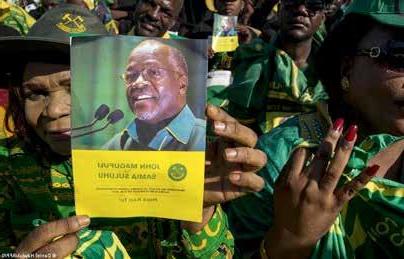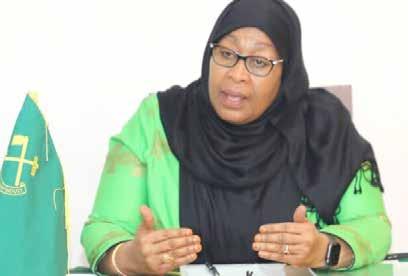
11 minute read
Editorial: Why do African leaders keep their health condition
from The Voice magazine
The death of President John Pombe Joseph Magufuli of Tanzania came as a rude shock to the world, he was a man who appeared to be strong, physically and mentally and doing great work for his country, his health didn’t seem an issue, he led the charge against non-existence of Covid 19 in his country but for a period of three weeks he disappeared from the radiance of his country that men and women started asking after their president. Unfortunately the now President, then Vice President Samia Suluhu Hassan on state televised announcement confirmed the President has died and he died of heart failure conditions. The cause of his death has angered the populace pretty more that the people who elected him did not know of his health condition and how severe his heart condition was. There are now more rumors of foul play that he could have been poisoned or infected by Covid-19 virus deliberately but whatever the true story is, the question we are forced to ask is why African leaders keep their health condition secret from their people until their sudden death? Not long ago, Africa was mourning the passing of the outgoing president of Burundi, late Pierre Nkurunziza. Till today, the cause of his death is still debatable while many thinks he died from Covid-19 complications but the Burundi government claims it was a sudden brief illness associated with heart attack. He was just 55 years old. President Magufuli was 61 years old. From records, this has been like for decades that the ill-health of African leaders are kept secret and lies upon lies are told to the public until eventually the ultimate end of mankind - death forces them to accept that something is wrong. I could remember the late of Kenyan First Republic president Jomo Kenyatta, he had heart conditions and it was kept secret until he suffered mild stroke in 1968. His predecessor, retired president Daniel arap Moi caused a near-panic in 1996 when he went for a cataract operation in Israel owing to the fact that Kenyans were used to him making news headlines. Failing health of Michael Sata, president of Zambia (2014) who died in office, although he was 77, there were rumours of his failing health yet he contested and won and died in United Kingdom. Prime minister of Ethiopia, Meles Zenawi (2012) died in Belgium at 57 also of undisclosed infection. Then John Atta Mills, president of Ghana (2012) died in his home country of stroke and throat cancer at the age of 68. He won the presidential election in 2008 and was in office for only three years. President of Pastor Amb. Elvis Iruh Editor-in-Chief Malawi, Bingu wa Mutharika died in 2012after he suffered a heart attack in April and died two days later at the age of 78. Bacai Sanha, the president of Guinea-Bissau suffered from diabetes and died in Paris after four years as president at the age of 64. Throughout his time in office, he suffered from several health complications and was continually in and out of the hospital and yet he would not step down or resign from office because of ill health. That of Nigeria was more dramatic, denial upon denial while President Umaru Musa Yar’Adua was dying. During his first term, allegations of ill health were reported but it was denied until he died at 58. Advanced intestinal cancer killed President Omar Bongo in June 2009 in Barcelona, Spain, after being in office for 42 consecutive years. He died aged 72 and was one of the longest-serving rulers in history. His son who succeeded him is also battling poor health, he had suffered a mild stroke that he took several months of treatment in abroad before returning back home and he still hanging on to power. After 24 years, President Lansana Conte of Guinea died of undisclosed illness at the age of 74. He battled complications from diabetes and heart-related conditions. The question is now who is going to be the best. Nigeria President, Muhammadu Buhari has been rumored severally to be dead yet he is still governing the most populous black nation in the world, Nigeria. When would these leaders learn to quit from office on grounds of ill health which is nothing to be ashamed of. It is natural course of life.
Advertisement
ONE EURO A MONTH SUPPORT TO THE VOICE MAGAZINE .....
Since you’re here... Support the Voice magazine so we stay publishing for your reading pleasure…..
Welcome to you our readers and our followers. We have a small favour to ask. More people, like you, are reading and supporting the Voice News magazine since we stopped the hard copy print in 2016. We have continued to serve you the magazine in the same format with all production cost covered like editing, page designs, photography and digital distribution via online channels. The Voice News magazine has been an independent organization, we do not receive any form of subsidy except the support of our advertisers, readers and friends. We made the choice to keep our reporting open for all, regardless of where you live or what you can afford to pay. Our advertising drive continue to grow. You can support us through this medium by promoting us among your friends, colleagues and clients as well,. You can promote your businesses and services with us as your way of support.
Our editorial independence means we set our own agenda and voice our own opinions. You are free and welcome to contribute both commercial and political independent articles for our reading audience without bias. We want to continue to give a voice to those less heard, exploited or turn away. We continue to rigorously challenge those in power to do what is right and just.
We hope you will consider supporting us from now on. We need your support to keep delivering quality journalism that’s open and independent. Every reader contribution, however big or small, is so valuable. Support The Voice News magazine as little as one EURO and it only takes a minute through your bank account.
For The Netherlands Account Name: Stichting Paddi Europa IBAN: NL29SNSB0908374372 SWIFT CODE: SNSBNL2A (For payment from abroad) Bank: SNS BANK Address: Utrecht, The Netherlands
Thank you. TV Management





a wound in my heart,” said President Hassan. “Today I have taken an oath different from the rest that I have taken in my career. Those were taken in happiness. Today I took the highest oath of office in mourning,” she said in her maiden speech. Under the constitution, President Hassan will serve the remainder of Magufuli’s second five-year term, which does not expire until 2025. She is a former office clerk and development worker, Hassan began her political career in 2000 in her native Zanzibar, a semi-autonomous archipelago, before being elected to the national assembly on mainland Tanzania and assigned a senior ministry.
Rose through the ranks
Tanzania’s soft-spoken former vice president has been sworn in as the East African country’s first female president after the death of John Magufuli. She becomes the first woman to occupy such an office in her country as well as the whole of East Africa. Presently she is the only woman in such position in Africa with executive powers. The other woman is the President of Ethiopia but
her position is more of ceremonial as the executive powers lines with the Prime Minister to govern the country.
Who is Samia Suluhu Hassan?
Samia Suluhu Hassan is a soft-spoken, veteran politician. Also Madam Hassan is 61, she made history when she was picked in 2015 as Presidential running mate to late President John Magufuli and now she has been transformed by destiny to become President with the death of her former leader. “It’s not a good day for me to talk to you because I have
She rose through the ranks of the ruling Chama Cha Mapinduzi (CCM) until being picked by Magufuli as his running mate in his first presidential election campaign in 2015. The CCM comfortably won and Hassan made history when she was sworn in as the country’s first ever female vice president. The pair were re-elected last October in a disputed poll the opposition and independent observers said was marred by irregularities. She would sometimes represent Magufuli on trips abroad but many outside Tanzania had not heard of Hassan until she appeared on national television last month wearing a black headscarf to announce that Magufuli had died at 61 following a short illness. In a slow and softly spoken address – a stark contrast to the thundering rhetoric favoured by her predecessor – Hassan solemnly declared 14 days of mourning in honour of the late President. “This is the time to stand together and get connected. It’s time to bury our differences, show love to one another and look forward with confidence,” she said. “It is not the time to point fingers at each other but to hold hands and move forward to build the new Tanzania that President Magufuli aspired to,” she said, amid opposition claims about the cause of Magufuli’s death. She will consult the CCM over the appointment of a new vice president. The party is set to hold a special meeting of its central committee soon. She paid a very emotional tribute to her predecessor John Magufuli. ‘Hold your breath’ Analysts say Hassan will face early pressure from powerful Magufuli allies within the party, who dominate intelligence and other critical aspects of government, and would try and

steer her decisions and agenda. “For those who were kind of expecting a breakaway from the Magufuli way of things I would say hold your breath at the moment,” said Thabit Jacob, a researcher at the Roskilde University in Denmark and an expert on Tanzania. “I think she will struggle to build her own base … We shouldn’t expect major changes.” From commentators in Tanzanian, they say that Hassan’s “leadership style is very different from the late president. They say she listens to counsel more and is not one to make unilateral decisions.” Hassan’s leadership will also be tested on her response to the coronavirus pandemic, which her predecessor dismissed. “A lot of people are looking to see if she will change strategy. Magufuli had faced a lot of criticism for how he handled the disease. He never put the country in lockdown and never encouraged people to wear masks or sanitize.” Hassan’s loyalty to Magufuli, nicknamed the “Bulldozer” for his no-nonsense attitude, was called into doubt in 2016. Her office was forced to issue a statement denying she had resigned as rumours of a rift grew more persistent, and Hassan hinted at the controversy in a public speech last year. “When you started working as president, many of us did not understand what you actually wanted. We did not know your direction. But today we all know your ambitions about Tanzania’s development,” she said in front of Magufuli.

Profile of President Hassan
Hassan was born on January 27, 1960 in Zanzibar, a former slaving hub and trading outpost in the Indian Ocean. Then still a Muslim sultanate, Zanzibar did not merge formally with mainland Tanzania for another four years. Her father was a school teacher and her mother, a housewife. Hassan graduated from high school but has said publicly that her finishing results were poor, and she took a clerkship in a government office at 17. By 1988, after undertaking further study, Hassan had risen through the ranks to become a development officer in the Zanzibar government.
She was employed as a project manager for the UN’s World Food Programme (WFP) and later in the 1990s was made executive director of an umbrella body governing nongovernmental organisations in Zanzibar. In 2000, she was nominated by the CCM to a special seat in Zanzibar’s House of Representatives. She then served as a local government minister – first for youth employment, women and children and then for tourism and trade investment. In 2010, she was elected to the National Assembly on mainland Tanzania. Then-President Jakaya Kikwete appointed her as Minister of State for Union Affairs. She holds university qualifications from Tanzania, Britain and the United States. The mother of four has spoken publicly to encourage Tanzanian women and girls to pursue their dreams. “I may look polite, and do not shout when speaking, but the most important thing is that everyone understands what I say and things get done as I say,” Hassan said in a speech last year. Hassan is the only other current serving female head of state in Africa alongside Ethiopia’s President Sahle-Work Zewde, whose role is mainly ceremonial.











